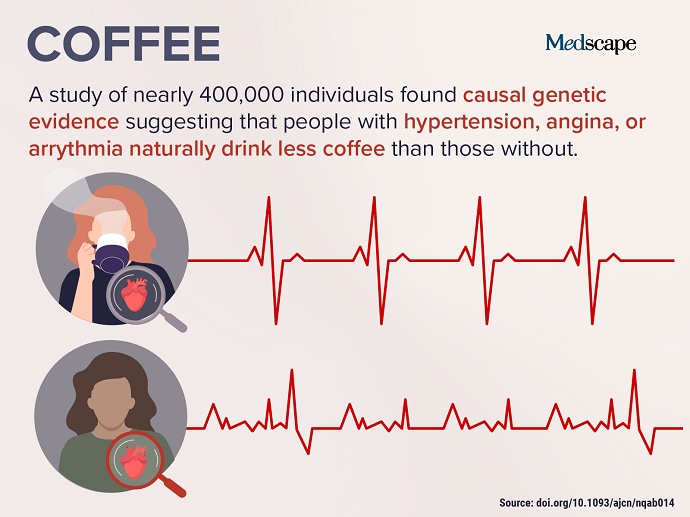Trending Clinical Topic: Coffee
Each week, we identify one top search term, speculate about what caused its popularity, and provide an infographic on a related condition. If you have thoughts about what's trending and why, share them with us on Twitter or Facebook.
A recent study on coffee intake among individuals with cardiovascular conditions (see Infographic below), along with new findings about caffeine consumption and brain changes, resulted in this week's top trending clinical topic. Using a large epidemiologic database, researchers recently determined that coffee drinking habits are largely driven by cardiovascular health. The study used a strategy called Mendelian randomization, which allows genetic information, such as variants that reflect higher blood pressures and heart rate, to provide evidence for a causal association. Participants with cardiovascular symptoms were "more likely to drink less caffeinated coffee and to be nonhabitual or decaffeinated coffee drinkers compared with those who did not report related symptoms," according to the authors.
The findings indicate that human bodies regulate behavior in ways that may go unnoticed. Researchers say the study also shows how other observational studies may create a false impression of health benefits linked to coffee consumption. Essentially, because those with certain conditions appear to naturally avoid caffeinated coffee, investigations of habitual coffee drinkers would then include fewer people who have those conditions, potentially causing a misleading health association.
Regarding health associations recently linked to coffee drinking, an imaging study found that regular consumption enhances concentration and improves motor control and alertness by inducing changes in the brain. Using fMRI, researchers found that connectivity in the somatosensory and limbic resting states was reduced in regular coffee drinkers compared with non–coffee drinkers. "The take-home message for practicing clinicians is that the regular intake of coffee, by reducing the connectivity of particular brain networks at risk, may be of relevance for attention/alertness, with possible implications in learning and memory, and also for motor control," senior author Nuno Sousa, MD, PhD, told Medscape Medical News.
In other coffee-related brain findings, a recent study found that regular caffeine consumption is tied to reduced gray matter volume; however, this reduction is not due to caffeine's negative impact on sleep. The findings showed that the impact of caffeine on gray matter appears to be temporary, with a rebound after a period of abstinence. Whether these changes are harmful or have any functional consequences remains unclear. The reduced volume was most evident in the right medial temporal lobe, including the hippocampus, which is essential to memory consolidation.
On the flip side, taking caffeine or drinking strong coffee half an hour prior to aerobic exercise may increase fat burning, according to a new study. The findings show that the effects of caffeine are greater if the exercise is done in the afternoon as opposed to the morning. Compared with placebo, caffeine increased fat oxidation by 10.7% in the morning and 29% in the afternoon. Caffeine also increased exercise intensity by 11% in the morning and 13% in the afternoon. These broader caffeine-related findings and specific studies on the health impacts of coffee consumption were met with much interest, resulting in this week's top trending clinical topic.
Credits:
Medscape Medical News January 2023
Cite this: Ryan Syrek. Trending Clinical Topic: Coffee - Medscape
Images. Pixabay.com








.jpeg)



No comments:
Post a Comment
If any query, please let me know.